Many get confused about what's safe and allowed during pregnancy. Most know that eating healthy, avoiding some foods, exercising, and taking prenatal vitamins are key. Still, there might be other things to think about.
As you prepare for your little one's arrival, you must create a healthy and nurturing environment for them to grow. To ease any worries, here is a helpful list of do's and don'ts during pregnancy that will shed light on what truly matters while having a baby.
Things Pregnant Women Should Do
Consume Multivitamins
Feeding on a well-rounded diet packed with vitamins and minerals is the top method to supply your body with the healthful components necessary for nurturing a baby. Yet, solely a nutritious diet may not meet every requirement for pregnancy.
- Folic acid
- Calcium
- Iron
These vitamins help the baby grow right and keeps health problems at bay. Your doctor can guide you to the right vitamins or a bunch of them that work best for you. A standard multivitamin often has DHA, EPA, or both. They're types of omega-3 fats. They are essential for your baby's brain to grow right. We would suggest you consult with your regular OBGYN for better knowledge on the dosage, as unprescribed high dosages can be harmful to the baby.
Workout
The old belief that is expecting moms should avoid heavy lifting is no longer valid. These days, we understand that working out benefits both mother and baby.
- Insomnia
- Muscle pain
- Excessive weight gain
- Mood problems
Did you continue your usual exercise when you became pregnant? Keep going! Check with your doctor for any changes, particularly as you enter your second and third trimesters.
If you weren't physically active before discovering your pregnancy, consult your doctor. They could help you find a workout schedule. This new routine must be safe and cozy for you and your developing baby.
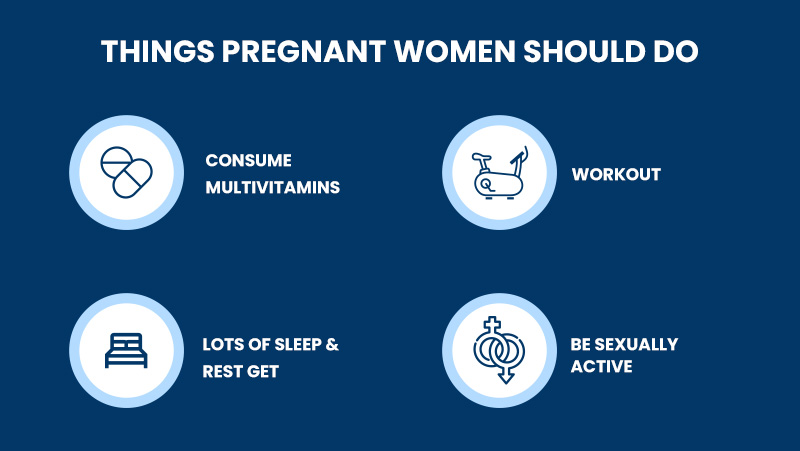
Gеt Lots of Slееp & Rеst
During your nine-month pregnancy, ups and downs in hormones, feelings of excitement, and worry can make sleep hard to get. Pregnancy needs much from you, most of all in the last trimester, and adеquatе slееp bеcomеs vital.
Make sure to sleep for at least 7-9 hours each night. Tiredness indicates that your body requires more rest. So, do your best to get as much sleep as possible. We understand that a comfortable, sound sleep might be hard to achieve when carrying weight inside your womb, on your back, and your feet. However, there are specific ways to ease your sleep routine, such as using pregnancy pillows.
Pregnancy pillows are specifically made with the comfort of expectant mothers in mind. Regarding the best pillows, there is a vast array of options to suit every preference. From wedge pillows providing extra comfort to body pillows and bamboo fill to memory foam, there is something out there for everyone. These pillows come in different shapes, each tailored to fulfill specific needs.
Be Sexually Active
Having sex while expecting is okay unless there is a problem, such as placenta previa or another type of high-risk pregnancy. Doing safe activities with your partner is okay until your water breaks. If you feel uncomfortable, you might need to try different things. Again, for any confusion relating to intercourse during pregnancy and its safety, you should consult your doctor.
Consume Sea Food
Eating seafood fills you up with good stuff like Vitamins. This includes stuff that's good for your heart, like omega-3. It also packs in zinc and iron, which is great for mom and baby. But be careful with seafood that's not cooked enough - it can cause problems.
Although seafood contains various harmful viruses and bacteria, they can be thoroughly eliminated by washing and if cooked well. Pregnant women should avoid raw fish, as it contains high volumes of mercury, which is harmful to both the mother and the child. Examples of fish containing high levels of mercury include:
- Shark
- Swordfish
- Tilefish
- King mackerel
Feast on different kinds of seafood to ensure your mineral intake is spread out. Stick to a maximum of 12 ounces of fish every week.
Sleep on Your Side During the Third Trimester
Always slееp on your sidе during the final trimester. Experts say it's best for your baby's safety. This stands for night sleep and daytime naps too. If you find yourself waking up on your back, don't fret. Simply readjust and continue sleeping on your side.
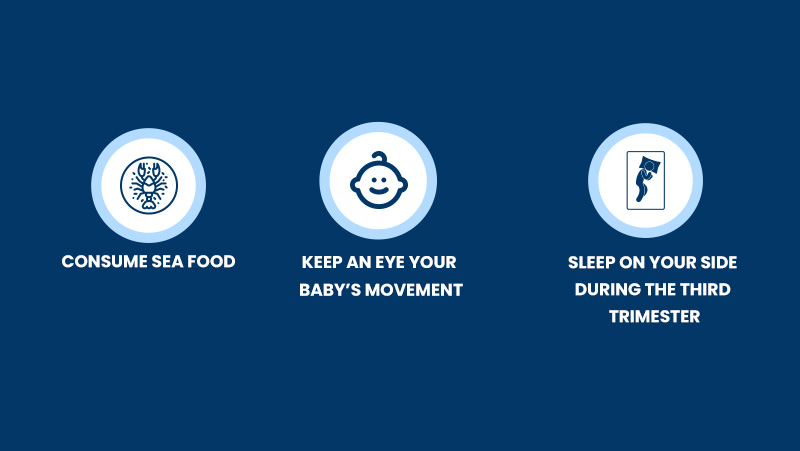
Keep an Eye on Your Baby’s Movement
Having your baby stir indicates they're doing okay. In general, you start noticing your baby's movements between weeks 18 to 24. For first-time parents, these movements may not occur until after the 20th week.
You might feel light twirls or flutters. As you get further along with your pregnancy, you may feel stronger movements, like kicks and jabs. Learn your baby's activity pattern and keep in touch with your midwife if these movements have changed, slowed down, or stopped. You should be able to feel your baby right up to and during birth.
Gain Healthy Weight
The "eating for two" guideline for future moms doesn't mean you can consume anything you want. Instead, ladies should plan out their food intake and quantity. Putting on excess weight when pregnant might be more detrimental to your child than helpful. In your first three months, your baby only requires roughly 100 additional calories daily to thrive.
Visit Your Dentist
For years, people stayed away from dentist visits. They were scared that teeth cleanings might make bacteria spread, causing an infection. Now, we know that isn't true. The group of doctors who specialize in pregnancy, also known as the Amеrican Collеgе of Obstеtricians and Gynеcologists, suggests that expecting moms should get their teeth and gums checked regularly during their pregnancy.
Get a Flu Shot
Doctors strongly urge moms-to-be to get a flu shot, except if the maker says no. Understand, the flu shot has no live virus. You can't get the flu from the shot. This is key when expecting. Moms-to-be getting the flu means worse side effects than women not expecting and the same age.
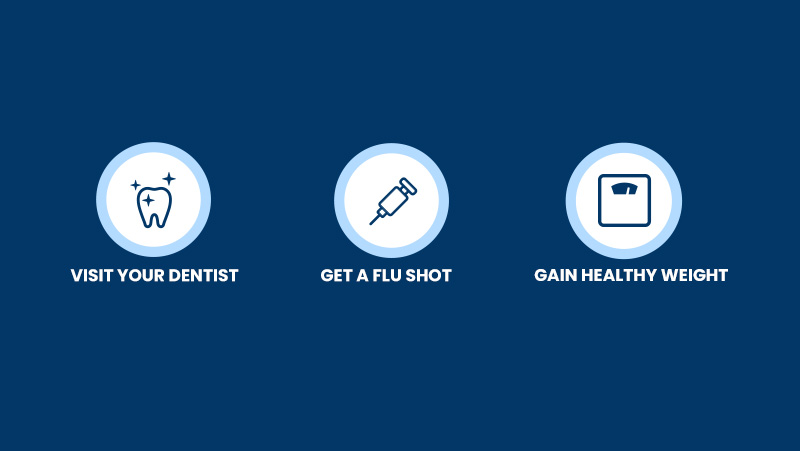
Things Pregnant Women Shouldn’t Do
No Smoking
Extensive research indicates a robust connection between expectant mothers who engage in smoking and the adverse effects it has on their infants' overall well-being and development. Specifically, offspring born to women who smoke during pregnancy are more likely to exhibit reduced birth weight compared to those whose mothers do not partake in smoking activities.
Additionally, these children face an increased susceptibility towards developing learning disabilities later in life. Furthermore, due to the addictive properties of nicotine, they may initiate cigarette consumption at an earlier age and progress into habitual smokers sooner.
No Going into the Hot Tubs or Sauna
The soothing effects of hot tubs, Jacuzzis, and saunas are widely recognized. However, pregnant women should exercise caution when utilizing these facilities due to potential risks associated with high temperatures.
Recent research suggests that using such amenities during the initial trimester may even result in a twofold increase in the likelihood of miscarriage. The elevated heat from hot water significantly raises body temperature, which can have adverse implications for fetal development and potentially contribute to congenital disabilities.
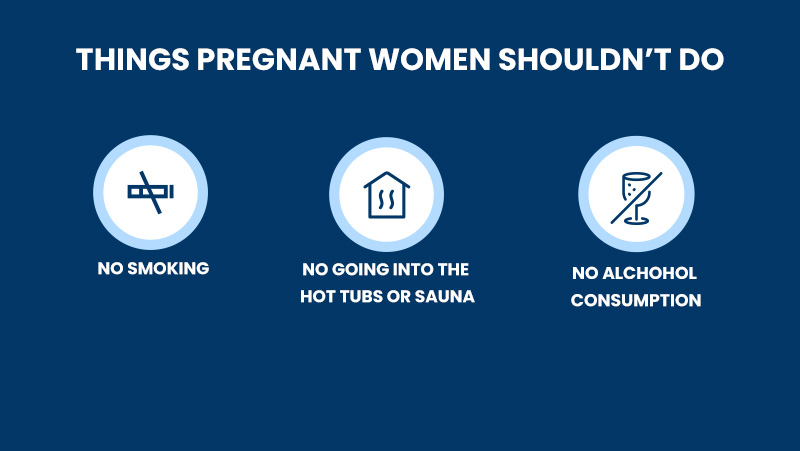
No Alchohol Consumption
Similarly, consuming alcohol while pregnant can significantly impact fetal development. Women who choose to consume alcoholic beverages during pregnancy expose themselves to potential risks associated with delivering babies affected by fetal alcohol syndrome (FAS).
This condition manifests through various symptoms, including low birth weight, learning difficulties, behavioral issues as well as delayed growth and developmental milestones. Prospective mothers must recognize that even minimal amounts of alcohol carry detrimental consequences throughout gestation since there exists no discernible level deemed safe for consumption.
Reduce Caffeine Intake
It is worth noting that caffeine consumption during gestation carries specific considerations, as it can traverse through the placenta and impact fetal heart rate acceleration. Current studies indicate that expectant mothers can safely consume one or two cups of coffee daily; however, indulging in excessive amounts by opting for triple-shot lattes while carrying offspring needs to be revised.
Don’t Lose too much Weight
While some individuals resort to extreme tactics like eliminating entire food groups with hopes of shedding pregnancy weight, this approach can prove detrimental to both maternal well-being and the baby's growth trajectory. Instead, a balanced diet comprising diverse foods from all major categories is optimal for maintaining a healthy weight throughout pregnancy.
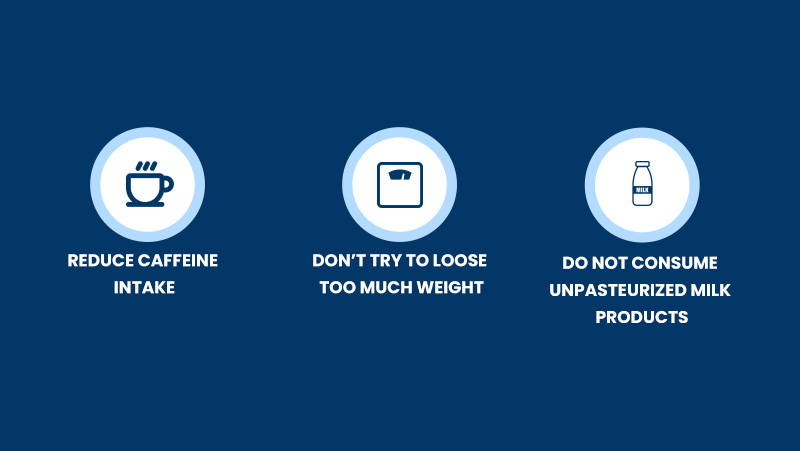
Do not Consume Unpasteurized Milk Products
Calcium intake plays an integral role for pregnant women aiming to meet their growing babies' needs; nevertheless, attention must be paid to its source—particularly concerning dairy products. Unpasteurized raw milk poses significant health hazards as it harbors harmful bacteria due to lacking pasteurization treatment—a process involving heat application aimed at killing pathogens present within consumables such as Listeria monocytogenes bacterium known for causing illness risk, including miscarriages or life-threatening complications.
Final Thoughts
Remember that caring for yourself throughout pregnancy is essential to caring for your unborn child. Adhering to these dos and don'ts may establish a healthy atmosphere that promotes your well-being and your child's optimal growth. Every action taken to ensure a healthy pregnancy, such as eating a well-balanced diet full of vital nutrients, exercising frequently, and getting medical help when necessary, adds to the experience.
Throughout the process, it's critical to be educated and seek advice from medical specialists to resolve any questions or ambiguities. Providing the necessary care and attention to these suggestions may give your child a secure and loving start and ensure a seamless transition into motherhood. All your choices today will impact your expanding family's well-being and contentment.
Sources:
Staying Healthy During Pregnancy: Kids Health
A healthy pregnancy: The Women’s













